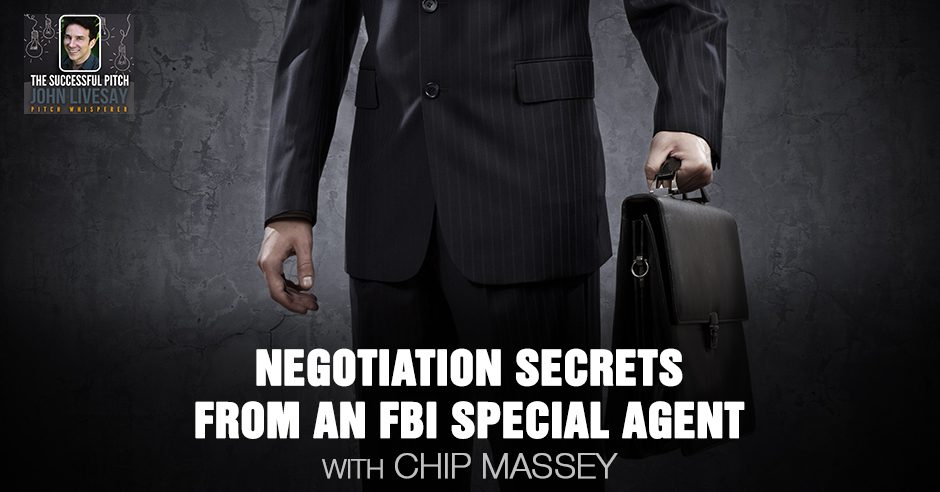Negotiation Secrets From An FBI Special Agent with Chip Massey
Posted by John Livesay in podcast0 comments
Episode Summary:
Growing a business means having to go through high-pressure situations. Sometimes, you get involved with misunderstandings among clients that take a toll on the entire business relationship. Talking about the art of negotiation in these kinds of situations is someone who is no stranger to this. Chip Massey, CEO of Plowshare Communications, is an FBI Special Agent who worked as a hostage negotiator. Sharing his experiences as an agent, he re-aligns it with how people running businesses can take some of the key points he learned in establishing a connection as quickly as possible. He talks about how to create instant rapport as well as how to de-escalate tense conversations with angry clients threatening to leave. Spilling negotiation secrets, he provides great insights that you can apply to your business.
—
Listen To The Episode Here
Negotiation Secrets From An FBI Special Agent with Chip Massey
Our guest is Chip Massey, who is the CEO of Plowshare Communications, which advises business leaders on strategic negotiations on how to accelerate the sales process by building strong, powerful, and trust-based relationships. For more than two decades, Chip has served as an FBI Special Agent and hostage/crisis negotiator. During his tenure, his work has ranged from collaborating with the CIA to crack espionage rings to high profile corruption cases to the post 9/11 counter-terrorism investigations in Washington, DC. As a hostage negotiator, he’s worked extensively in crisis situations including international kidnappings and fugitive apprehensions.
While he was within the Bureau, Chip was noted for his ability to quickly build rapport and his deep expertise interviewing both victims and criminal suspects. He spent several years coordinating with the FBI’s Victim-Witness Program as well as directing the FBI Citizen Academy in DC. Before that, he was a Methodist minister, so he brings his early training in crisis intervention and a gift for public speaking to bear. As someone who grew up in the Methodist Church in the Midwest suburbs of Chicago, I can’t wait to welcome him to the show. Chip, welcome.
Thank you so much, John. It’s a pleasure to be here.
Let’s have you paint a picture, Chip, of your own story of origin. Where did you grow up? How did you decide you wanted to be a minister and then how did that parlay into what you’re doing now?
I grew up in Dover, Delaware. My family had a dairy farm and we grew crops, we had cows and the whole shebang there. It wasn’t until I got to college that I was trying to figure out where I was going to fit in. Farming was a very lonely existence. It seemed that way to me. I loved the contact and calmness of people and I loved hearing their backstories. That’s what led me on to figure out what was going to be my next step. In college, I thought that it was going to be a ministry for me, being able to reach out to people in that regard and deal with their problems and be of help. Follow that, I went to seminary and then went into an appointment at a two-point church. Since you’re familiar with the Methodist system, you know that those are two churches that you’re responsible for. It was a rural area. I knew the people. I know the mindset.
[bctt tweet=”Empathy is the secret weapon the FBI uses. ” username=”John_Livesay”]
My thing about that, John, is it was a fantastic experience in terms of getting to know people and finding out their deepest problems and how I could be of a help. You could find a person that was in a crisis every day in that job. That was both fulfilling and also humbling because you have these people that trust you with everything that’s going on in their world and their life. You are the one representative of what God’s plan or direction is for their life. They’re looking for you to be of help. That was tremendous and fantastic, but it was also hard for me and my family. It’s a 24/7 on-call all the time and you’re gone to a lot. I knew in the back of my mind that I wanted something else. I felt something was missing. I don’t know if you can resonate with that or not but I knew that there was more that I needed and I wasn’t entirely happy in the position.
I can completely resonate with that. There have been stories throughout the decades of movies. Even if you think of Yentl, the Barbra Streisand movie back in the day, there’s got to be something more. That sparks the entrepreneurs’ spirit too. It’s like, “I don’t want to just work for somebody for the rest of my life. I have more to do. I have a book in me. I have a talk I want to give.” You were giving talks every week but there’s a sense of, “I’m here for a bigger purpose. I’m here to do something else besides just this.” Not that whatever I’m doing is not enough or okay, but that inner urge to express yourself in a bigger way is something a lot of people can relate to.
It is tying into that, honoring that and following that. Instead of saying, “I’d like to do that but,” “It would be fantastic, but,” there was something in me that was pushing forward. I went ahead, I looked into it and I talked to some people who were agents. I didn’t know what those guys did. I’ve seen the various shows like everybody else, in movies but I didn’t know what their day-to-day life was like and I didn’t know if that was going to be a solution for my current situation and whether I needed to look at something else. I knew what was inspiring for me and was pivotal in choosing the FBI as a career was the movie, Mississippi Burning. There was this government entity that was dedicated to taking down the Klan. They were above the politics, they were above the prejudices, they were enforcing the laws of the land, of the constitution. They were going to do it and they were going to stay there until it was done. It made a real impact on me. What a force of good that was. That’s what got me toward that lane and looking in that direction. You take a test. It’s how it starts out. You fill out a form, you turn it in and then the process goes from there. You are interviewed if you pass a certain test and then you take a battery of tests. It goes on and on.

Negotiation Secrets: That inner urge to express yourself in a bigger way is something that a lot of people can relate to.
Is it a personality test or an intelligence test?
I would love to tell you that it was based on intelligence and personality. I don’t think that’s what it was. At least when I took it, there was a criterion. It is more of a judgment screen. There was also a math portion, which I thought that a door slam shut in my face, I’m done. My math was not the greatest. There was also a writing portion. That was part of the screening process. There was also where you had to go through the medical clearance, you had to go through a polygraph, and then they went and did the background check with your neighbors, people that you’ve known and teachers. Most of your audience knows the drill on that. It’s extensive.
I preached my last sermon that Sunday morning and that afternoon, I reported to Quantico. I told the classic because you had to go around and introduce yourself and where you’re from. You’ve got guys there that are Special Forces, lawyers, accountants. There was a judge in our class. There were former police officers, pilots and here’s Chip Massey, a minister. It was a great experience. Thinking about it, I wish the academy would open up something that the general public could go to and participate in. Aside from the stress that they put you under in a class, there are so much interesting things to learn that people would benefit from.
[bctt tweet=”How To Create Instant Rapport.” username=”John_Livesay”]
Is it like the law school thing where they say, “Look to your left, look to your right. Only one of you will still be here by the end?”
They don’t do that. There is the idea, “We’re going to weed out the weak.” That’s what it comes down to. In my class, we started out with around 50, we ended up with 44 so not many washed out, but some wash out because of injury and that happens all the time. Some after the first few days of them telling you, “This is the real world of being in law enforcement,” some people that were not totally in tune with that and what that meant would also decide to part ways. They had a vested interest in making sure that you were going to get through this if you were the kind of person they were looking for.
Do you get to specialize and say, “I want to be a hostage/crisis negotiator,” or everybody has to carry a gun and go through and then you can specialize, almost like med school? You have to become a doctor and then you can become a specialist. Is that the way it was?
Exactly, that’s it. Everybody starts out as a special agent. That’s your title. Anything else you do is a collateral duty. We had people that were on SWAT Teams, that’s a collateral duty. We had people that are Evidence Response Team, that’s a collateral. It goes on and on, but your main focus is still investigations of crime. The way the Bureau is set up is that there are two houses. There’s the National Security side of it and then there’s the Criminal side of it. You will be selected to participate in one of those programs and in general, you stay within that lane. There is movement. I started out in National Security and moved eventually to Criminal. It took some time. You have to establish yourself, establish a reputation that you’re a hard worker, that you’re able to perform and you know how to have success. That’s how it works.

Negotiation Secrets: Establish a connection as quickly as possible.
I’m curious to ask you about what it was like to collaborate with the CIA because there was so much controversy after 9/11 that that was part of the problem, that the FBI and the CIA were not collaborating and sharing information. Do you have a story around that?
It was amazing to me when I first reported to the Washington field office. I was on an espionage squad and our specific area of focus was on Americans that have been co-opted by a foreign power to provide information. It was our job to track those people. On this specific squad, we were involved with trying to find a spy that we believed Russia had co-opted and was operating within our US government, which brought us to the CIA. We had certain allegations and information that led us to a specific individual at the CIA. It was a case officer. We were devoting a lot of resources to try to find who that person was. Part of that is to work with the agency, the CIA and figure out who this person is. There were tremendous people over there. I’m continually astounded by the level of professionalism, abilities and talents. These are fantastic people. It is both gratifying to see that not only do you believe in your own home as an FBI agent in the FBI, but you also have this huge respect and belief in the CIA and what they do. They’re fantastic analysts and case officers. It was a fantastic experience.
You’ve been featured as one of the people at the Carnegie New Leaders program at the US Military Academy at West Point. You have multiple places that are having you come and speak on these techniques to corporate leaders about how to build professional relationships quickly and profitably, which allows them to grow their business. Let’s double-click on how we create instant rapport as opposed to people checking their phone or just walk out of there going around, “That didn’t go well.” What clues are there that we can do to prevent that from happening?
The first thing that we would say in terms of a hostage negotiation skill set, what we want to do is we want to establish a connection as quickly as possible. The same is true in the business world. The stakes are different, certainly. One person that is holding somebody for ransom and on the other hand, you’re trying to make a connection to somebody who is in and out of a conversation with you, not engaged with you. The first thing that we would do and I advise my business leaders to do is to find that thing that is going to pull them out of that phone, that text and that email.
[bctt tweet=”Whatever I’m doing now is not enough.” username=”John_Livesay”]
One time when we were on an arrest, a lead came out of the Philadelphia field office. We were to find this person and make the arrest, take them to court and so forth. It turned out that there was a bad address that we had. He wasn’t there. This is bad news because there is a huge force out to accomplish this and you’ve got a guy out there in the wind, you don’t know where he is. We had a phone number for him. That’s all. They’re trying to make a decision. They’re contacting the heads of the field office. “What do you think is the best course of action?” They’re like, “We don’t know. Let’s talk about this.” Eventually it was, “Let’s try to call this guy.” I’m on the arrest team and who are you going to give the phone to but the negotiations? They hand me the phone and say, “Can you call?”
I’m thinking in my head, “What am I going to say to this guy if he picks up?” If it’s me and I’m on the run, I’m not picking up a phone that I don’t know the number to. I’m thinking I probably got one in a thousand shot he’s going to pick up. I’m thinking, “What do I say if he does?” I’m putting some things together and I’m looking around this area where he’s from, in the Bronx. I put the number in, it rings, it goes, it rings forever. It seemed like it probably was ten seconds. You hear that there is a connection, but there’s nobody talking. My next thing is, “My name is Chip. I’m here to help you.” I leave it hanging for a little bit longer and still nothing. I then say this, “How bad does your life suck right now?” I let that hang. It seemed like forever.
I’ve got all these people breathing down my neck. The bosses are waiting for the call. They’re like, “What’s going on? What’s happening?” Teams are looking around. It’s tense and then I hear, “What’s your name again?” I went on from there and I said, “I’m an FBI agent but I want to see if what I’m thinking about is right. You can say nothing or you can grunt, whatever, but I’m guessing that your life sucks because you don’t know where you’re going to sleep most of the times. You can’t keep staying at the same place. You can’t use an ATM. You can’t show yourself too much around with too many people that you’re familiar with because you don’t know who’s going to drop a dime on you.”

Negotiation Secrets: “The key to success is confidence and the key to confidence is preparation.” – Arthur Ashe
You’re putting yourself in their shoes, painting the picture.
That’s it, John. You key on the things that you already know that exist in their world.
They may not have even thought about it like, “You’re right. I can’t go to an ATM.”
It could be. Two weeks in, he’s been successful thus far to live on the lam but it’s draining. Hollywood glamorizes Bonnie and Clyde being on the run and so forth, but the fact of the matter is it sucks. It’s draining. You don’t have any friends. You can’t call home because if you’re doing it right, you’re not going to make those mistakes. That’s the same thing I tell my business leaders. It’s that if you’re going to meet a client for the first time or you’re going to meet a prospect for the first time, you had better do your homework before you even pick up that phone. By that I meant as an agent, before we would do any interviews, any interaction with the public in an investigation, we find out as much about that person as we could. Most of it was a result of public databases. It was Googling, it was finding out on LinkedIn, it was seeing if did they have an IG profile, what they were saying on Twitter. All these things. Some of it is going to be strange or fabricated or not in line with who they are, but you’re going to pull some things. You’re going to tease out some information that’s important.
It reminds me of a quote from Arthur Ashe, “The key to success is confidence and the key to confidence is preparation.” I’m a big proponent of that when it comes to sales and any situation. You’ve described a tense conversation but in the business world, those happen a lot even if someone’s not on the lam. Losing a client, they’re mad at you and people have a very hard time with their emotional IQ not getting them back or defensive. How do you help clients deescalate these tense conversations when they’ve got an angry client threatening to leave?
[bctt tweet=”If you’re going to meet a client for the first time, you’re also going to meet a prospect for the first time. ” username=”John_Livesay”]
This is perhaps one of the greater opportunities for a breakthrough. This is the thing that gets me excited when I explain this concept to clients because it’s counterintuitive. We are designed by nature that when we’re under attack, when we feel that there is something that could be pulled from us, we become defensive. We contract. We try to come up with things as to why this is a dumb idea. One of the things I like to do is I talk about the relationship you have with your significant other. If you think about the last time you were in a fight, you were in an argument, were you thinking about the greater points that they were making when they were yelling at? Or were you thinking that, “I should take some of this to heart and there’s something here I can change or there’s something here I know that I could modify, this is an excellent point?” No, none of that is going through anybody’s head. We’re waiting for that person to pause because we’re looking to attack. We’re looking to jump in at that point, go for the jugular and say, “No, it’s you that’s wrong and here’s why.”
This is the thing I say, “Did anybody solve a problem in that? You might have won a fight in your mind, but what did you gain?” What is your goal? If your goal is to understand and create a better relationship, you failed. If your goal was to win a fight or to dominate the other person, you did that well. Congratulations. I say to them the same thing. If principles of de-escalation are the same thing, what you need to do is put yourself in their shoes and you have to keep the goal in mind. This takes training. As I said, it’s counterintuitive. It doesn’t come naturally. You have to keep at it. Every interaction you have with somebody when you’re under that kind of stress and when that threat is present, you have to train yourself to think, “What do I want to do here? What is my goal?” My goal is I want to keep this client happy. I want to make good on the promises that we made them. I want to find out deeply where we messed up.
I want to show them that it’s important to me and this is where empathy comes in. Empathy is huge and I am glad that it’s being touted now as being an important skill. The FBI uses it. The FBI use it not because we want to be soft and cuddly. We use it because it is deadly efficient. It is the quickest way to get into somebody’s world and then to bring them to a more rational mindset. That’s all part of the de-escalation process. If somebody is at a ten, like my guy on the lam and they’re attacking, it’s my job to bring them down. How do I do that? By showing empathy.

Negotiation Secrets: Utilize empathy, reach out with those feelings, and then use your active listening skills.
The third part of what you do, which is so crucial, is building trust. You have this wonderful blog about My Dog Is A Better Listener Than You. I’m guessing that listening and trust go hand-in-hand. Can you tell us about that?
We say it all the time, “I need to be a better listener. You’re not listening to me.” We hear these comments and we think about these things. In reality, we do suck at listening. It wasn’t until I took the certification course to be a hostage negotiator that the skill set of active listening opened up to me. I’ve heard about it, I’ve been trained about it in the past but this took it to a different level. I’m not only listening for the information that they’re trying to give to me and trying to portray themselves at, but I’m listening for the things that are emotional. I’m listening to the content that holds value to them because what I want to do is I want them to put the gun down. I want them to walk out of the house.
I can’t get there from the jump, so I need to work that through. I need to hear their side. I need to hear what’s going on and I need to connect to that. The only way to do that is by them talking to me and me listening to the point where I can identify with what they’re saying. I can see it. I can feel it. I can almost smell it. What are their fears? What are their concerns? Who’s done who wrong?
I’m utilizing empathy, reaching out with those feelings, active listening skills and I’m going to pick up on things that they’ve said. “You said that the person that fired you, you felt it was unjust. What else can you say about that? How was it unjust?” I get them to unpackage more and more about it. You never let a motion go by without identifying it. We’re talking about a very tense situational anger with a client. Not only are you angry but it sounds like you have a real deep resentment toward us. If you key on those things in their world, the more they’re going to come to you. They’re going to open up. You use those open-ended questions, you expand, you get more robust answers and they then begin to feel that this is now a collaborative process. This person is hearing me. I use that with my dog. My dog, when I am around the house and she’s engaged with me, she’s looking at my face. The dog is reading that but the dog is also picking up on my body language. She sees when I’m rushing around, she knows when I’m trying to get out of the house or she sees when I might be frustrated. She also knows when I’m going to go for a snack and she makes sure she positions herself to be right there. There’s so much that we leave on the table and that’s what I try to get across to my clients. If you’re not deeply listening to somebody, you are missing cash on the table. I guarantee you, you’re missing opportunities.
[bctt tweet=”You better do your homework before you even pick up that phone. ” username=”John_Livesay”]
Double-clicking on, “It sounds like you’re not just angry, but that you resent us. Is that accurate?” What you’re doing there is you’re describing the problem. I’ve said this many times when people are pitching to get a new client. The better you can describe the problem that someone is experiencing, the more they think you have the solution. That’s another way of looking at what you described there. This concept of listening as a way to not lose cash, I’ve had several clients that have said, “We have a whole list of cold case files.” We call them the dead accounts we’ve lost. We didn’t even know how to begin to get them back so I work with them on repairing and rebuilding those relationships through listening. Nine times out of ten, the number one reason why clients leave is, “You didn’t listen to me. I told you I was concerned about that deadline not being met and it didn’t get met. I’m leaving because you didn’t listen to me.”
Even if it was an old team of people that now there’s a new team, you still have to own what the old team did. Getting people to understand that the people have to feel listened to and before they can start trusting you again, to maybe hire you again, it’s quite a journey and so many people make the mistake of, “We’ll go in with a lot of research and numbers. I’m not going to listen to you and showing how smart you are.” You’ve got to repair this stuff first. You offer different kinds of workshops for different kinds of companies. There’s basic negotiation, there’s the intermediate, then there’s the executive intensive. Who’s your ideal client for the executive intensive?
That would be the leadership team or anybody that has client-facing responsibilities. I’m looking for people that are trying to have a breakthrough in how they connect to their clients and how they deal with their employees to bring up the organization as a whole. That would be the people that could benefit from that the most.
How can people reach out to you? Are there any social media platform you will encourage people to follow you on?
I’m on LinkedIn, Instagram and Twitter, @ChipJMassey.
Chip, thank you so much for being a great guest and sharing your wisdom from your experience working in incredible intense situations that we can now apply to our own lives, where the stakes aren’t quite as high but the same lessons can definitely be applied.
Thank you. It was a pleasure.
Links Mentioned:
- Chip Massey
- Plowshare Communications
- My Dog Is A Better Listener Than You
- LinkedIn – Chip Massey
- Instagram – Chip Massey
- @ChipJMassey on Twitter
- https://www.ChipMassey.com/
- Quantmre.com
Wanna Host Your Own Podcast?
Click here to see how my friends at Brandcasting You can help
Get your FREE copy of John’s latest eBook Getting To Yes now!
John Livesay, The Pitch Whisperer
Share The Show
Did you enjoy the show? I’d love it if you subscribed today and left us a 5-star review!
-
- Click this link
- Click on the ‘Subscribe’ button below the artwork
- Go to the ‘Ratings and Reviews’ section
- Click on ‘Write a Review’
- JohnLivesay.com
- John Livesay Facebook
- John Livesay Twitter
- John Livesay LinkedIn
- John Livesay YouTube

